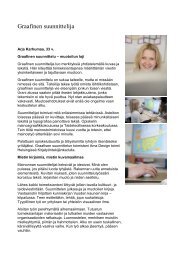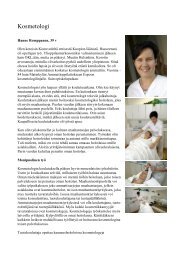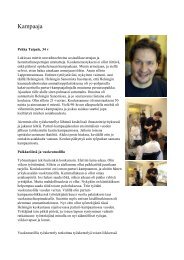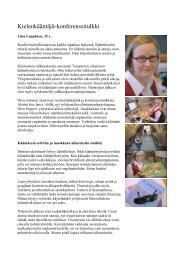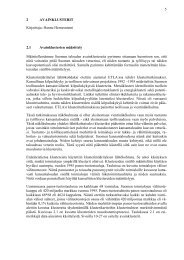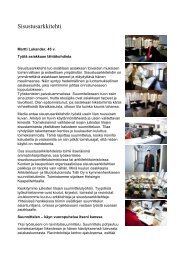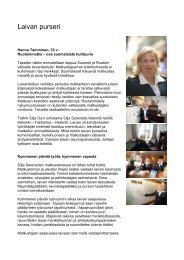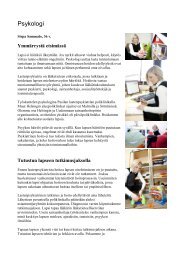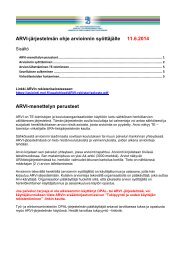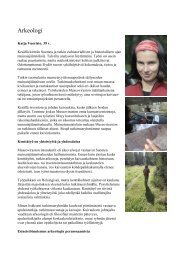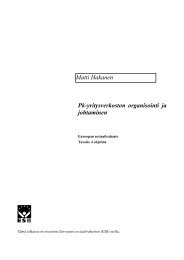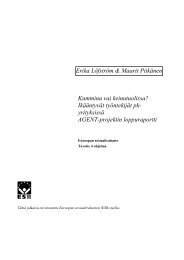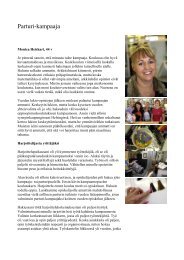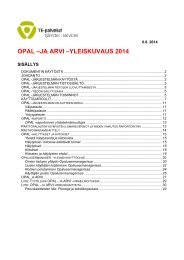Working Life Barometer in the Baltic Countries 2002 (pdf) - mol.fi
Working Life Barometer in the Baltic Countries 2002 (pdf) - mol.fi
Working Life Barometer in the Baltic Countries 2002 (pdf) - mol.fi
Create successful ePaper yourself
Turn your PDF publications into a flip-book with our unique Google optimized e-Paper software.
264<br />
<strong>the</strong> salary due from <strong>the</strong>ir ma<strong>in</strong> occupation does not come on time. In fact, <strong>the</strong><br />
salary of more than one-third of Lithuania's work<strong>in</strong>g people had come late<br />
dur<strong>in</strong>g <strong>the</strong> year preced<strong>in</strong>g <strong>the</strong> survey. This proportion is three times as great as<br />
<strong>in</strong> Estonia, and nearly twice as great as <strong>in</strong> Latvia.<br />
An <strong>in</strong>creased <strong>in</strong>cidence of <strong>fi</strong>xed-term employment contracts has been noticeable.<br />
Their relative proportion (29 %) is already beg<strong>in</strong>n<strong>in</strong>g to be on <strong>the</strong> same<br />
level as <strong>in</strong> Latvia. At <strong>the</strong> same time, though, <strong>the</strong> percentage of (illegitimate)<br />
orally agreed work contracts has fallen signi<strong>fi</strong>cantly. There has <strong>in</strong>deed been a<br />
transition from orally agreed work<strong>in</strong>g relationships to <strong>fi</strong>xed-term employment<br />
contracts agreed <strong>in</strong> writ<strong>in</strong>g. In this regard, <strong>the</strong> development can be considered<br />
positive. On <strong>the</strong> o<strong>the</strong>r hand, at <strong>the</strong> same time, <strong>the</strong> number of extra agreements<br />
drawn up <strong>in</strong> addition to <strong>the</strong> employment contract proper has clearly grown. In<br />
several cases, <strong>the</strong> content of <strong>the</strong> extra agreements may be such that it is disadvantageous<br />
to <strong>the</strong> worker. In <strong>the</strong> worst <strong>in</strong>stance, <strong>the</strong> extra agreement may even<br />
water down <strong>the</strong> juridical security provided for <strong>in</strong> <strong>the</strong> employment contract.<br />
Lithuanian wage earners who have signed an extra agreement are clearly less<br />
satis<strong>fi</strong>ed with <strong>the</strong> content of <strong>the</strong> agreement than those who have signed one <strong>in</strong><br />
Latvia and Estonia.<br />
Satisfaction with one's job and work<strong>in</strong>g conditions has become polarised <strong>in</strong><br />
Lithuania. Public-sector workers are satis<strong>fi</strong>ed <strong>in</strong> this respect, but <strong>the</strong> private<br />
sector has <strong>the</strong> lowest degree of satisfaction <strong>in</strong> all <strong>the</strong> <strong>Baltic</strong> countries. It is<br />
worthy of note that only half of <strong>the</strong> private-sector wage earners felt it was possible<br />
to make a compla<strong>in</strong>t that <strong>the</strong>y were dissatis<strong>fi</strong>ed with <strong>the</strong>ir work<strong>in</strong>g conditions.<br />
This proportion is def<strong>in</strong>itely smaller than <strong>in</strong> <strong>the</strong> Lithuanian public<br />
sector, or elsewhere <strong>in</strong> <strong>the</strong> <strong>Baltic</strong> nations. Fear of los<strong>in</strong>g one's job is what most<br />
probably accounts for <strong>the</strong> silence. In addition, work has become more <strong>in</strong>tensive<br />
and stressful than before. This change has been a general one: it has affected<br />
wage earners <strong>in</strong> both <strong>the</strong> public and <strong>the</strong> private sector.<br />
In Lithuania, too, <strong>the</strong> amount of employer-paid tra<strong>in</strong><strong>in</strong>g has been quite small,<br />
particularly <strong>in</strong> <strong>the</strong> private sector. Only about one <strong>in</strong> ten private-sector workers<br />
had attended a course paid for partly or completely by <strong>the</strong> employer dur<strong>in</strong>g <strong>the</strong><br />
preced<strong>in</strong>g year. Of <strong>the</strong> wage earners <strong>in</strong> <strong>the</strong> public sector, however, more than<br />
one <strong>in</strong> three had received tra<strong>in</strong><strong>in</strong>g. This tra<strong>in</strong><strong>in</strong>g is often connected with utilisation<br />
of <strong>in</strong>formation technology at work. Both computers and mobile phones



